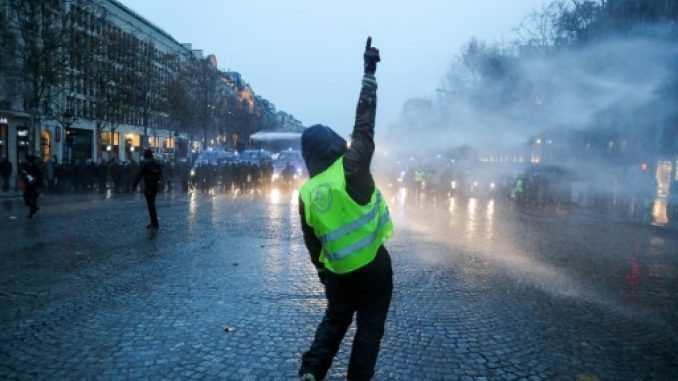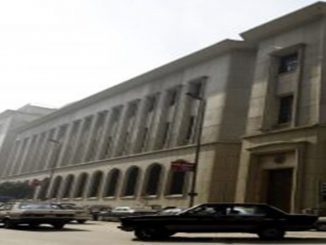
Yellow vests have become the symbol of an ongoing protest movement in France
Rights group Amnesty International called Monday for the release of an Egyptian lawyer arrested after posing in a photo wearing a yellow vest symbolic of protests in France.
Mohamed Ramadan, a human rights lawyer, was arrested on December 10 in the northern city of Alexandria on charges including spreading false news, distribution and possession of leaflets and yellow vests.
His arrest came as reports circulated that Egyptian authorities were restricting the sale of yellow vests — the symbol of an ongoing protest movement in France.
Several traders told AFP in December that sale of the vests had been curbed under instructions from Egyptian authorities.
Ramadan’s “detention over a Facebook post mocking government restrictions on the sale of yellow vests is utterly absurd,” said Amnesty’s North Africa campaigns director Najia Bounaim.
“The Egyptian authorities must release him immediately and unconditionally and drop all the charges against him,” she added.
Ramadan has been held in custody since his arrest and a hearing on Tuesday is set to discuss prolonging his pre-trial detention, his lawyer Mohamed Hafez said.
France’s “yellow vest” protests began in November against rising fuel taxes and quickly evolved into broader opposition to government policy, spiralling into violence in Paris and other cities.
Egypt imposed heavy restrictions on demonstrations under a 2013 law passed following the military ouster of Islamist president Mohamed Morsi after mass protests against his rule.
Rights groups regularly criticise Egypt for curbing freedom of expression and crushing dissent.
The Amnesty International’s statement reads:
Egypt: Release human rights lawyer detained for wearing yellow vest
Egyptian authorities must order the immediate and unconditional release of a human rights lawyer who has been detained since 10 December for “inciting social unrest” by posting a picture of himself on Facebook wearing a yellow vest, said Amnesty International ahead of a hearing to renew his pre-trial detention tomorrow.
Mohamed Ramadan shared the image after Egyptian authorities restricted sales of the vests – similar to those worn by demonstrators in France – in a bid to prevent copycat protests in Egypt.
“Mohamed Ramadan’s detention over a Facebook post mocking government restrictions on the sale of yellow vests is utterly absurd. His case highlights the extreme measures Egyptian authorities are prepared to take to crush the slightest perceived challenges to their authority,” said Najia Bounaim, Amnesty International’s North Africa Campaigns Director.
“Mohamed Ramadan was detained solely for expressing his views and in relation to his work as a human rights lawyer. The Egyptian authorities must release him immediately and unconditionally and drop all the charges against him.”
Three plainclothes National Security officers (NSA) arrested Mohamed Ramadan in Alexandria on 10 December 2018 as he got off a bus while he was on his way home. His fate and whereabouts remained unknown to his family and lawyers until he appeared before the Montazah Prosecutor’s office the next day.
The prosecutor ordered his pre-trial detention for 15 days while he was investigated for several vague charges, including “membership of a banned group”, “spreading false news through social media” and “inciting social unrest”. The prosecutor has renewed his detention every 15 days since his arrest, and the Ministry of Interior transferred him to Borg el-Arab prison on 8 January.
The evidence against him included the possession of five yellow vests that the authorities claimed were going to be used for anti-government protests, according to two of his lawyers who were present during his interrogation on 25 December.
One of Mohamed Ramadan’s lawyers told Amnesty International an NSA officer had physically assaulted him immediately after his arrest and informed him to “stop [his] political work”.
He was kept blindfolded and chained to the ground while he was held at an NSA detention centre in Alexandria. Two of his lawyers who attended Ramadan’s interrogation on 22 January confirmed that Mohamed Ramadan said that on 17 January he had been beaten in the stomach by a prison guard when he intervened to defend another prisoner who was being physically assaulted.
Mohamed Ramadan is a human rights lawyer who provides legal assistance to human rights defenders, peaceful protesters, workers and residents of informal settlements in Alexandria.
The Alexandria Criminal Court had previously sentenced him in April 2017 to 10 years in prison in absentia, followed by five years under house arrest and a five-year ban on using the internet, because of a Facebook post.
He was convicted on a series of vaguely worded national security charges including insulting the President, misusing social media platforms and incitement to violence under the country’s draconian counter-terrorism law.
Amnesty International considers his conviction an example of the authorities’ crackdown against peaceful critics. His retrial was suspended pending the Supreme Constitutional Court’s decision on the legality of the Counter-Terrorism Law under which Mohamed Ramadan was convicted.



